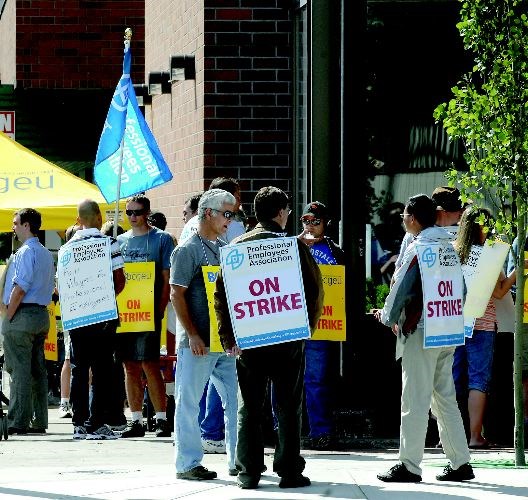It was beautiful day for a protest, however Katie Day-Wilks found out at least one picket-line crosser left his sunny disposition at home.
Standing on the steps in front of the door to the Service BC access centre in downtown Prince George with fellow union employees from the B.C. Government & Service Employees Union, Day-Wilks tried to explain to the man why they had walked off the job Wednesday. But he apparently was in no mood to listen to her suggestion to not enter the building in support of the one-day strike action.
"He swore at me and told me to mind my own business," said Day-Wilks.
"Other than that, most people have been understanding and are willing to come back the next day. Some people have to get some things done today, like renewing their driver's licence. A lot of this stuff is online. We just want people to understand where we're coming from and stand up for us and we'll stand up for them when they're on strike."
The 25,000 striking BCGEU members, including about 1,000 in the Prince George area, were joined on the picket lines by the Public Employees Association and the Canadian Office and Professional Employees Union Local 378 (ICBC's unionized staff). All three unions are seeking better wages.
Picket lines were established at several provincial workplaces in the city, including the Prince George Regional Correctional Centre, as well as the three government liquor stores, which were closed Wednesday.
The BCGEU and PEA (which has about 1,200 members province-wide) want a 3.5 per cent wage increase the first year and a cost-of-living allowance in the second year of their contract. The government is offering a 3.5 per cent wage hike over two years. The unions have been working without a contract since March 31 and have been without any wage increases since April 2009.
"It's been a long time since we've had a deal for the public service and before [the contract expired] it was very low increases -- one per cent or two per cent and we had to take concessions in other places -- and we're not prepared to do that anymore," said Susanne Skidmore, chair of BCGEU Local 1211.
"The government has offered a wage increase and they want us to mine that from what we already have and make concessions in other areas and that's not right."
The BCGEU contends the province could make up the $40 million it would cost to grant their 3.5 per cent raise by allowing all of B.C's 197 government liquor stores to open seven days per week. The union estimates Sunday store openings and its suggestion to expand the duties of sherriffs to include traffic duty now handled by police would feed an additional $280 million into the province's revenue stream.
"Those are good concrete ways we could be making extra money in this province but the government turned up their nose at those things and they're not interested in actually doing it," said Skidmore. "I'd really like to see the employer come back to the table and live up to the responsibility to the people who live here in these communities."
The BCGEU staged a one-day strike on Aug. 20, and BCGEU picket captain Dawn Dreher said the lack of advance publicity over the initial protest day caught more people unaware. Instead of about a hundred people crossing the picket line into the Service BC offices, as happened in August, only a dozen had crossed by noon on Wednesday. Some staff at Plaza 400 offices remained at their posts to process licence applications and issue certificates, but all employees were excused from full shifts by the union to serve four hours of picket-line duty.
"We've had quite a few people who supported the line and turned away and definitely gave us the acknowledgment we're fighting for a reason," said Dreher. "The people who did cross, we got the acknowledgment but they had business that had to be done and we're not in the business of bullying. We don't want to have any other people have hardships, financial or loss of job, and some of the business they are renewing would have resulted in that."
Depending on the government's response, Dreher expects the job action will escalate over the next few weeks and said that could involve an extended strike.
"I'm hoping the government understand we're just trying to make a living," said Dreher.
Government workers include corrections officers, social workers, information technology specialists, inspectors, warehouse workers, conservation officers and clerical staff. The strike did not affect essential services like child protection, forest firefighting, schools, hospitals and ferries.
The PEA and its Government Licenced Professionals (foresters, engineers, agrologists, veterinarians, mining inspectors, and psychologists), joined the BCGEU picket lines in five B.C. cities, including Prince George, Burns Lake, Dawson Creek, Nelson and Cranbrook.


